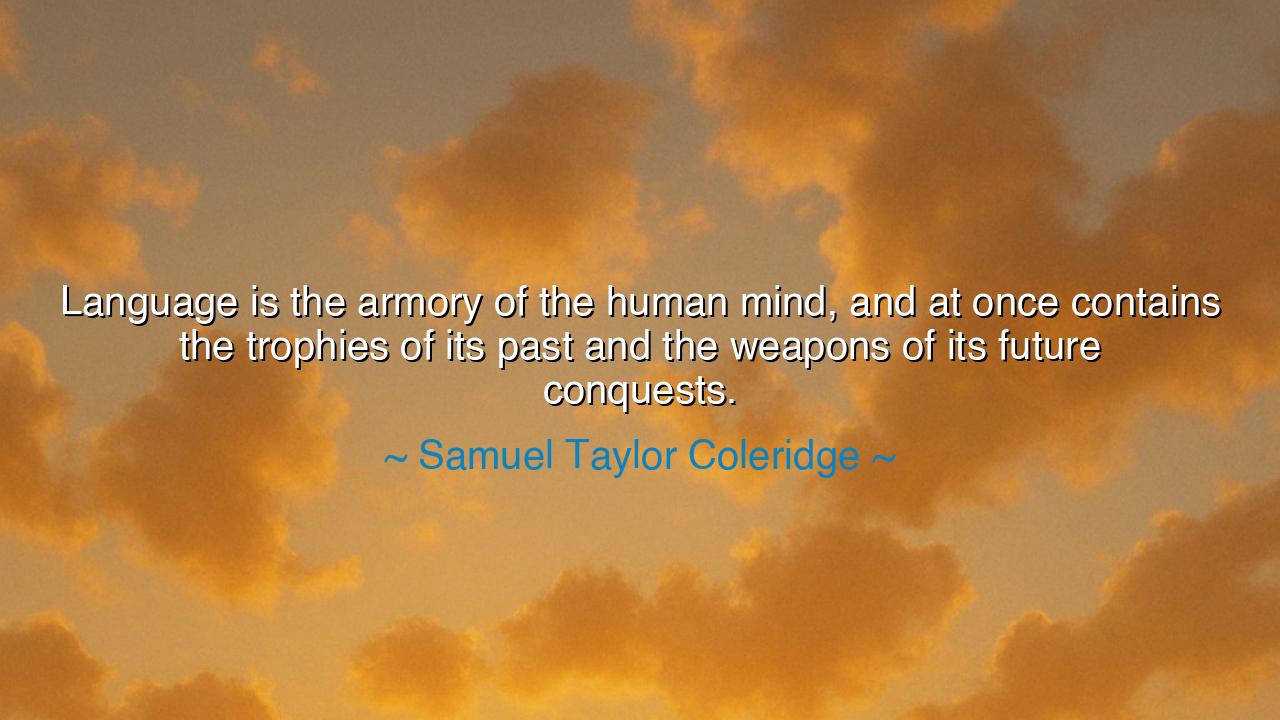
Language is the armory of the human mind, and at once contains
Language is the armory of the human mind, and at once contains the trophies of its past and the weapons of its future conquests.






In the vast tapestry of human existence, there is one tool that binds all of humanity together, shaping and defining the very essence of our minds: language. Samuel Taylor Coleridge’s words, “Language is the armory of the human mind, and at once contains the trophies of its past and the weapons of its future conquests,” resonate with the timeless truth that language is not merely a tool for communication, but the very soul of civilization itself. It is through language that we can express our thoughts, record our history, and forge our futures. It is both a record of our past triumphs and failures, and a tool to carve new paths forward into the unknown.
From the dawn of civilization, when Homer’s epics were first sung around the campfires, language has served as the bridge between the past and the future. Consider the ancient Sumerians, who etched their stories and laws into clay tablets. These early inscriptions, though simple in form, were the first attempts to preserve the wisdom of their time and to communicate across generations. The Sumerian language, through its written word, acted as both a trophy of the civilization’s achievements and a weapon in securing their legacy, allowing their thoughts to endure long after their cities fell into ruin. In Coleridge’s view, language serves this dual purpose for all mankind: it captures our history, making the past live again in the minds of those who read and hear it, while also arming us for the battles yet to come.
The great Greek philosophers were no strangers to this power of language. Socrates used language as a weapon, not to defeat his opponents, but to illuminate the truth through dialogue. Plato recorded his teacher’s wisdom in dialogues that continue to shape human thought to this day. For these men, language was not just a means of sharing knowledge, but a means of transformation—of turning the minds of the youth towards the light of truth and virtue. Language, for them, was indeed an armory, and it held both the trophies of the past (the wisdom of ages) and the weapons for future conquests: the power to educate, persuade, and ultimately, change the world.
The Romans understood this as well. The works of Cicero, for example, demonstrate the mighty influence of language. As a great orator, Cicero wielded language like a sword, using it to defend the Republic and shape the future of Rome. His speeches, full of eloquent rhetoric and reason, were not merely expressions of thought, but tools in a battle for the soul of Rome. His words were meant to inspire action, to rally the people against corruption and tyranny, showing that language, when used with intention and skill, could lead a people toward their highest ideals.
Coleridge’s idea of language as the armory of the mind is especially poignant in an era of rapid change, where technological and social revolutions are reshaping the very fabric of society. As we speak and write, we carry the trophies of our cultural inheritance—the ideas and knowledge passed down through generations. But we also hold in our hands the weapons for the future: the tools to challenge, to question, and to create anew. In every word, we have the power to build or to destroy. The language of the digital age, for example, has become the tool for the revolution of communication—it connects, it empowers, and it transforms, but it also holds the potential for manipulation and misinformation. Thus, the responsibility of language has never been greater.
The lesson we must take from Coleridge’s reflection is clear: language is a powerful force—one that carries the weight of our past and the hopes of our future. It is not enough to simply speak; we must choose our words with care, understanding that they shape the world in ways both seen and unseen. To wield language effectively is to hold the keys to both the preservation of knowledge and the creation of a new reality. Every time we communicate, we are either strengthening or weakening our collective legacy, either securing the truth or sowing the seeds of confusion.
Thus, as we move forward into the unknown future, we must remember that the words we use today are the trophies of tomorrow’s history. The power of language lies not in the grand speeches of the powerful, but in the small acts of communication that shape the way we live with one another, think about the world, and approach the challenges ahead. Let us, then, wield language with wisdom and purpose, for in doing so, we hold both the trophies of the past and the weapons of the future.






AAdministratorAdministrator
Welcome, honored guests. Please leave a comment, we will respond soon